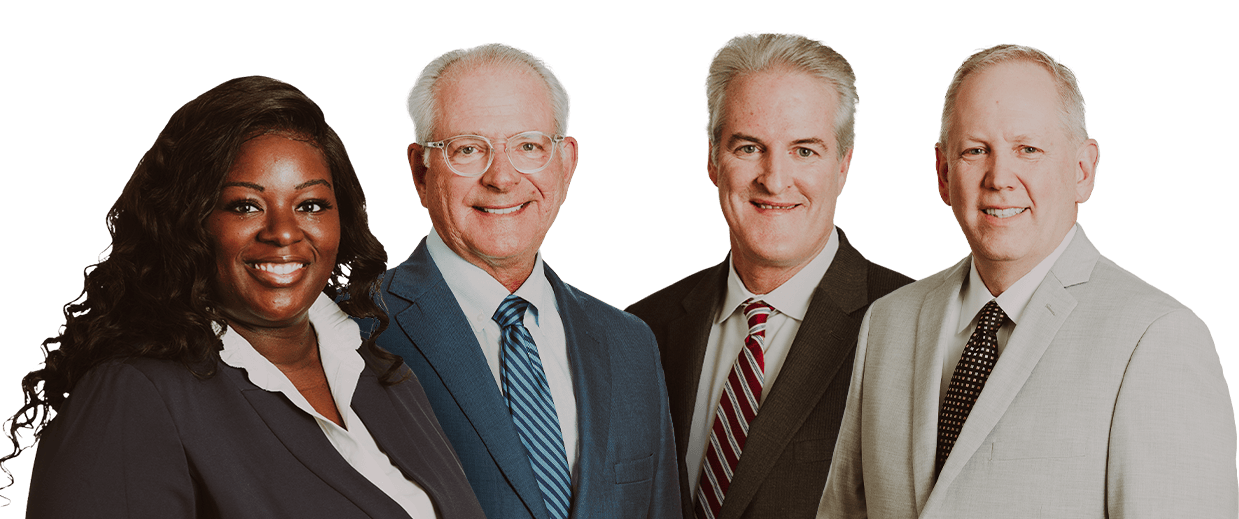
That's a Guarantee. Clearwater’s First Personal Injury Law Firm
Your world can turn upside down when you suffer an unexpected injury. Whether you were in an auto accident or got hurt on the job, know that you can trust our firm to help you make things right. Watch our video below to learn more about us and how we can serve you.

Results That Speak For Themselves
Our Success Stories
-
$2,000,000 Legal Malpractice Settlement
A medical malpractice case also became a legal malpractice case when an attorney failed to file suit within the appropriate time period for these type of claims. As a result, the client’s statute of limitations ran out, and she was unable to receive compensation for her suffering and losses.
-
$4,000,000 Medical Malpractice Settlement
A 40-year-old mother of three was admitted to a hospital for a routine urological surgery. Post-surgery, she was given an epidural for the pain. Overnight, her blood pressure dropped, causing her to become hypovolemic.
-
$8,250,000 Medical Malpractice
A medical doctor and mother of two bled to death following a laparoscopic appendectomy. Her husband, also a medical doctor, filed a suit against the surgeon and the hospital for his wife’s wrongful death.

Clearwater Personal Injury Lawyer
Were you hurt in an accident in the Clearwater, Florida area due to someone else’s negligence? You should be compensated for your injuries and suffering.
Perenich, Caulfield, Avril & Noyes Personal Injury Lawyers was the very first personal injury law firm in the Tampa Bay area. Since 1955, we’ve been the fiercest advocates for accident and injury victims. Collectively, our personal injury attorneys boast more than 300 years of collective experience.
We’ve successfully won hundreds of millions of dollars in settlements and verdicts for our clients. Trust our award-winning, top-rated lawyers to fight for you and help you get all of the money you need after an accident. You’ll have centuries of combined experience in your corner, and you can rest assured that you’ll be best positioned for the win you deserve.
Call a Clearwater personal injury attorney at (727) 591-3354 or fill out our online contact form today to schedule an appointment with our team.

Testimonials That Speak For Themseves
Our Client Reviews
-
“From the first day we met this law group I felt very comfortable and knew we would be well taken care of. This was our first experience filing for SSD, and was not disappointed. The lawyers are awesome and very professional.”- Shari J.
-
“Very nice they worked with you. Never ignored me with my case. Always on top to work with you. Thank you so much for all that you have done to help me! Very highly recommend.”- Margarita O.
-
“My appointed attorney was Jacqueline, Bryant. She is very compassionate about her client and work. When it comes to negotiation, she's a Beast and she gets the job done.”- Alaina J.
-
“Friendly knowledgeable and kept me informed about my case. Any offer, bill or question was readily answered. Would definitely recommend and refer people to Bryan Caulfield and his team!!”- Betty B.
-
“Mrs Bryant works her butt off to make sure you get what is do to you in medical and beyond! They won’t take your case if they don’t feel you haven’t been wronged.”- Christine R.
-
“Working with Mark Perenich on my auto injury case was an absolute game-changer. From the very beginning, he brought a level of professionalism, expertise, and care that immediately put us at ease.”- Kerry B.
-
“What was particularly awe inspiring was the recall of facts and testimonies from medical personnel that Para Legal Ms. Josephine Elizabeth Angelo was able to make. Her memory and acumen for detail was admirable.”- Maylisa Y.
-
“Lorrie and Allyson are phenomenal. I highly recommend them to anyone. It seemed like a never ending journey but I can’t thank them enough for diligently fighting my case with the greatest integrity, support and prayers.”- Former Client
-
 Mark H. PerenichPersonal Injury Attorney
Mark H. PerenichPersonal Injury Attorney -
 Bryan D. CaulfieldBoard Certified Civil Trial Attorney
Bryan D. CaulfieldBoard Certified Civil Trial Attorney -
 Matthew E. NoyesPersonal Injury Attorney, Social Security & Workers’ Compensation Attorney
Matthew E. NoyesPersonal Injury Attorney, Social Security & Workers’ Compensation Attorney -
 Jacqlyn F. BryantPersonal Injury Attorney
Jacqlyn F. BryantPersonal Injury Attorney -
 Lorraine E. RobinsonBoard Certified Civil Trial Attorney, Social Security & Workers’ Compensation Attorney
Lorraine E. RobinsonBoard Certified Civil Trial Attorney, Social Security & Workers’ Compensation Attorney -
 John Jay Avril (retired)Personal Injury Attorney
John Jay Avril (retired)Personal Injury Attorney

Benefit From 300+ Years of Experience
Over our more than half-century of experience, we have:
- Fought cases all the way to the Florida Supreme Court and the Supreme Court of the United States on behalf of our clients
- Assembled a stellar team of paralegals, investigators, and support staff
- Recovered hundreds of millions of dollars in verdicts and settlements, and
- Found justice for thousands of clients
At Perenich, Caulfield, Avril & Noyes Personal Injury Lawyers, our personal injury attorneys have successfully obtained more than $675 million (and counting) on behalf of our clients. We’re able to get top results for our clients consistently, and we’ll put our tried-and-true strategies to work to help you get the money you deserve.


Award-Winning Lawyers. Life-Changing Results.

Types of Personal Injury Cases We Handle
Standing up for accident and injury victims throughout Tampa Bay
Why Should I Hire a Clearwater Personal Injury Lawyer?
Your world can turn upside down when you suffer an unexpected injury. Whether you were in an auto accident or got hurt on the job, know that you can trust Perenich, Caulfield, Avril & Noyes, P.A., to help you make things right.
We’ve exclusively practiced personal injury law in Pinellas County since 1955. We know what it’ll take to win your case and put you in the best position to maximize your financial recovery. To date, we’ve recovered more than half a billion in settlements and jury awards for clients just like you.
Our personal injury lawyers are award-winning, top-rated, and well-recognized trial experts. Our team includes attorneys who are board certified in civil trial law – and we’re ready to help you fight for what you’re owed. Call our law offices to schedule your free consultation today.
-
Accidents are stressful. It will take time for you to recover from your injuries. You’ve been through enough – and hiring an injury lawyer is a win-win. It gives you the opportunity to focus on getting better and increases the likelihood of winning your case. If you’ve suffered a personal injury, reaching out to our accident lawyers in Clearwater is the best way to protect your future.
-
Did you know that people who hire injury attorneys:
- Are more likely to win their personal injury claims, and
- Typically secure up to 3.5 times more compensation than if they’d handled the matter themselves.
It’s simple: hiring a lawyer can put more money in your pocket.
-
The defendant(s) (at-fault party) in your case will be prepared to fight you every step of the way. They’ll be well-represented by savvy adjusters and teams of skilled attorneys. The truth is that they’ll have an advantage from the start. They’ll know how to manipulate you during a moment of stress, confusion, and uncertainty.
The best thing you can do is level the playing field by hiring a Clearwater accident lawyer with extensive experience. You’ll have an advocate in your corner who will stand up for you and work tirelessly to hold the defendants fully accountable for your injuries. Contact us for a free consultation. During our meeting, we will provide legal advice and discuss what occurred to better understand your case.
-
Insurance companies – and any other at fault party you might face – have seemingly endless resources at their disposal. They’ll dip into those resources to help them reach a low-cost settlement or verdict. To them, the cost of experts, investigators, and specialists is a drop in the bucket compared to what they might have to pay you for the full value of your personal injury claim.
How can you compete when the other side has so much to work with? When you hire a lawyer, you’re not just getting a legal advocate. You’re also getting the force and weight of the law firm you hire. That includes the firm’s network of respected experts and professionals who can provide invaluable insight into your case.

We treat you like family.
If you can’t come to us, we’ll come to you.
Representing Accident Victims in Tampa Bay since 1955


Why Choose Us?
No one has been an advocate for accident victims longer than Perenich, Caulfield, Avril & Noyes Personal Injury Lawyers. Since 1955, our law firm has exclusively focused on personal injury throughout Clearwater, including Antietam Acres, Coachman Lakes Estates neighborhood, Glenwood, Downtown Clearwater, and On Top of the World. We know what it takes to not only win your injury case but also maximize your financial recovery.
That’s why we have received some of the highest honors and awards in the legal profession, including:
- Board Certified in Civil Trial by the Florida Bar Association
- AV Rated by Martindale-Hubbell, Highest Rating
- Super Lawyers and Super Lawyers Rising Stars
- Tampa Bay’s Top Lawyers by Tampa Bay Magazine
- Top 100 Trial Lawyers – National Trial Lawyers
- Top 25 Medical Malpractice – National Trial Lawyers
- Multi-Million Dollar Advocates Forum
- Top 40 Under 40 for National Black Lawyers
- FL Verdicts Hall of Fame for Intentional Torts
- America’s Most Honored Professionals
- Over 90 5-Star Reviews in Google Business Profile
We know that the stakes are high and that there’s so much riding on your personal injury case. Let our Clearwater personal injury lawyers help you get the win you deserve.
Find out how our team can assist you by calling us at (727) 591-3354 or reaching out online today.


Personal Injury FAQ
The Answers You Need
It’s good to have questions after an accident. Our attorneys are here to give you the answers you need.
-
Every case is different. Ultimately, the value of your case will depend on answers to questions about your injury (or injuries) and life after your accident.
- What types of injuries have you sustained, and how severe are they?
- Has your ability to earn an income changed because of your accident?
- What out-of-pocket costs have you incurred?
- What future expenses will you likely have?
- What kind of emotional toll have the accident and your injuries taken?
Generally, personal injury claims with more serious injuries and more extensive trauma are worth more.
At Perenich, Caulfield, Avril & Noyes, P.A., our personal injury lawyers have successfully obtained more than $675 million (and counting) on behalf of our clients. We’re able to get top results for our clients consistently – and we’ll put our tried-and-true strategies to work to help you get every last dollar to which you’re entitled.
-
After an accident in Florida, you’re typically entitled to seek both economic and non-economic damages.
- Economic damages are awarded to make up for your out-of-pocket expenses and injury-related costs like medical bills, disability, rehabilitation and therapy, or funeral expenses if an accident is fatal.
- Non-economic damages are paid to compensate for the consequences of an accident that don’t have a set value. Think pain and suffering, emotional distress, mental anguish, and loss of consortium.
Our personal injury lawyers have won hundreds of millions of dollars for injury victims and families. Over and over again, we’re able to help our clients win by making sure that we identify all damages a client should be entitled to under Florida state laws and work with leading experts to ensure we understand the present and future value of each and every one.
-
The Florida statute of limitations for most personal injury lawsuits has been changed. A four-year time limit applies to accidents occurring on or before 3/23/2023, and a time limit of tow years applies to accidents taking place after that date.
That timeframe is also two years for cases alleging wrongful death cases. You’ll lose the right to demand compensation if you don’t file your claim on time.
There are exceptions to these deadlines in some cases. So, it’s critical to reach out for the help of an experienced personal injury attorney as soon as you can after you or a loved one gets hurt.
-
Most – but not all – personal injury claims in Florida are based on negligence. Negligence means that someone else didn’t act reasonably under the circumstances and, as a result, you got hurt.
When it comes down to proving negligence in a lawsuit, it’s far from this simple. You’ll have to establish that the defendant owed you:
- Duty of care
- Breached that duty
- Caused your injuries. This can be complicated – especially when the negligent party and/or insurance company fight you every step of the way.
- You suffered damages as a result.
We have been representing plaintiffs in negligence cases for more than 66 years. It’s what we do – and it’s what we excel at.
-
At Perenich, Caulfield, Avril & Noyes Personal Injury Lawyers, we serve all neighborhoods in Clearwater and the surrounding areas, including:
- Antietam Acres
- Coachman Lakes Estates
- Country Club Estates
- Downtown Clearwater
- Glenwood
- Island Estates
- Misty Springs
- Old Clearwater Bay
- On Top of the World
- Sand Key
- And more
-
Florida has modified comparative negligence rules with a 51% bar to recovery. So, you can still potentially get money for your injuries after an accident, but your compensation will be reduced if you’re assigned some of the blame. Insurance companies and other negligent parties will try to shift as much of the blame for an accident to you as they can.
If you do nothing, you could watch your compensation dwindle – or disappear altogether.
Our accident attorneys know insurance company strategies like this all too well. We’ll be prepared with evidence that can disprove these claims or, at the very least, minimize how much fault is ultimately assigned to you. The less fault you share, the higher your take-home award can be.
-
Most personal injury lawyers work on contingency. This means there’s no upfront cost to hire them to represent you.
Instead, their fee is entirely based on whether or not they win your case. If they don’t win a settlement or verdict, you don’t pay.
When your case is successful – meaning that you agree to a settlement deal or win a jury verdict – the accident lawyer recovers a percentage of your financial recovery.
Typically, this ranges from about 33% to 40%. Every law firm has its own fee structure – be sure to discuss this with an attorney during your initial case assessment.






















